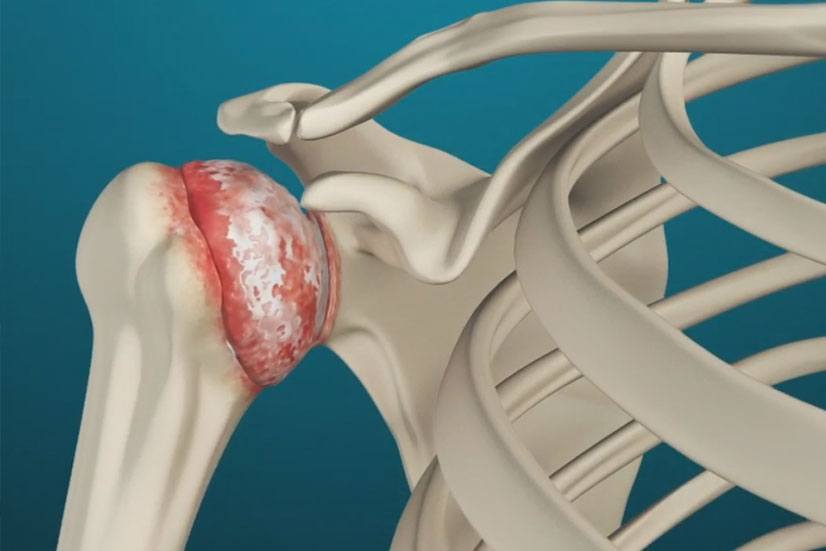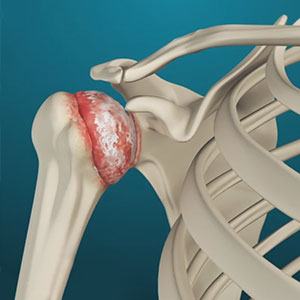
Total shoulder replacement, also known as shoulder arthroplasty, is a surgical procedure designed to replace the damaged or arthritic parts of the shoulder joint with artificial components. This surgery is often considered when non-surgical treatments have failed to provide relief from shoulder pain or improve joint function. Understanding the conditions that might lead to a total shoulder replacement and the benefits of this procedure can help patients make informed decisions about their treatment options.
Conditions Leading to Total Shoulder Replacement
Several conditions can lead to the need for a total shoulder replacement. The most common include:
- Osteoarthritis (OA):
- Description: OA of the shoulder is a degenerative joint disease that causes the breakdown of cartilage in the shoulder joint. As the cartilage wears away, bones begin to rub against each other, leading to pain, stiffness, and decreased mobility.
- Symptoms: Patients with shoulder OA often experience pain that worsens with activity, stiffness, a grinding sensation in the joint, and reduced range of motion. Daily activities such as lifting objects or even dressing can become difficult.
- Progression: Over time, the pain can become more constant, and the shoulder may lose much of its function. When conservative treatments like physical therapy, medications, and corticosteroid injections no longer provide relief, total shoulder replacement may be recommended.
- Rheumatoid Arthritis (RA):
- Description: RA is an autoimmune disease that causes chronic inflammation in the joints, including the shoulder. The immune system mistakenly attacks the synovium (the lining of the joint), leading to pain, swelling, and eventual joint damage.
- Symptoms: Symptoms include persistent pain, swelling, warmth, and stiffness in the shoulder. The inflammation caused by RA can also lead to significant joint deformity and loss of function.
- Progression: In severe cases, the ongoing damage to the joint may necessitate a total shoulder replacement to restore mobility and relieve pain.
- Post-Traumatic Arthritis:
- Description: This form of arthritis develops after an injury to the shoulder, such as a fracture or dislocation. The trauma can damage the cartilage, leading to arthritis over time.
- Symptoms: Symptoms include pain, swelling, stiffness, and a decrease in shoulder function. These symptoms may appear months or even years after the initial injury.
- Progression: If the condition worsens and significantly affects the patient's quality of life, a total shoulder replacement might be needed to alleviate pain and restore function.
- Rotator Cuff Tear Arthropathy:
- Description: This condition occurs when a large rotator cuff tear leads to significant arthritis and degeneration of the shoulder joint. The rotator cuff muscles are responsible for stabilizing the shoulder, and when these muscles are severely damaged, the joint can become unbalanced, leading to wear and tear.
- Symptoms: Patients may experience pain, weakness, and an inability to lift the arm. The shoulder may also become unstable, making it difficult to perform daily activities.
- Progression: For patients with severe rotator cuff tear arthropathy, total shoulder replacement, particularly reverse shoulder arthroplasty, may be recommended to improve function and reduce pain.
- Avascular Necrosis:
- Description: Avascular necrosis occurs when the blood supply to the bone is disrupted, leading to the death of bone tissue. This can affect the head of the humerus (the upper arm bone) and result in the collapse of the joint surface.
- Symptoms: Patients with avascular necrosis may experience pain that worsens with activity and eventually becomes constant as the condition progresses.
- Progression: When avascular necrosis leads to severe damage to the shoulder joint, total shoulder replacement may be required to restore function.
Benefits of Total Shoulder Replacement
Total shoulder replacement is a highly effective procedure with several benefits for patients suffering from severe shoulder conditions:
- Pain Relief:
- Benefit: The primary benefit of total shoulder replacement is the relief from chronic shoulder pain. By replacing the damaged joint surfaces with artificial components, the painful bone-on-bone contact is eliminated.
- Outcome: Most patients experience a significant reduction in pain, allowing them to return to activities they enjoy.
- Improved Shoulder Function:
- Benefit: Total shoulder replacement can restore the function of the shoulder, allowing patients to perform daily activities with greater ease.
- Outcome: Patients often report improved range of motion, strength, and the ability to lift objects, reach overhead, and engage in physical activities.
- Enhanced Quality of Life:
- Benefit: combination of pain relief and improved function can lead to a significant enhancement in the overall quality of life.
- Outcome: Patients can resume their normal activities, participate in hobbies, and enjoy a more active lifestyle.
- High Success Rate:
- Benefit: Total shoulder replacement has a high success rate, with most patients reporting satisfaction with the results. The artificial components used in the procedure are designed to last many years, providing long-term relief.
- Outcome: Patients typically experience long-lasting improvements in pain and function, with many able to return to a near-normal level of activity.
- Correction of Shoulder Deformities:
- Benefit: For patients with shoulder deformities caused by conditions like arthritis or rotator cuff tear arthropathy, total shoulder replacement can help correct these deformities.
- Outcome: Restoring the proper alignment and function of the shoulder joint not only improves appearance but also enhances mobility and reduces pain.
Conclusion
Total shoulder replacement is a life-changing procedure for many patients suffering from debilitating shoulder conditions. By understanding the conditions that lead to shoulder replacement and the benefits of the procedure, patients can make informed decisions about their treatment options. If you are experiencing chronic shoulder pain that interferes with your daily life, it may be time to consult with an orthopedic specialist to discuss whether total shoulder replacement is the right choice for you.
Medical References
1. American Academy of Orthopaedic Surgeons (AAOS)
2. Mayo Clinic - Shoulder Replacement Surgery
3. National Institutes of Health (NIH) - Shoulder Replacement
4. Johns Hopkins Medicine - Shoulder Replacement Surgery








